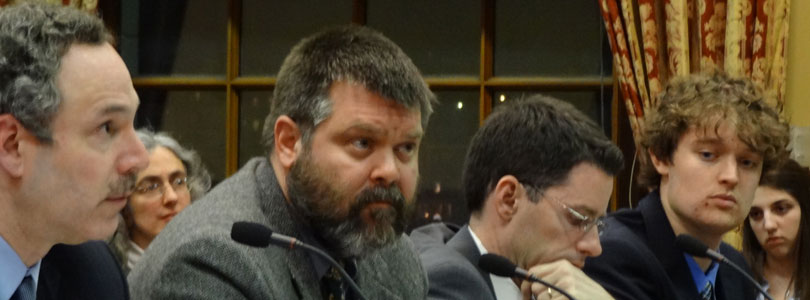Campaign Finance Reform Targeting National Organizations Worries Local Groups
The political stars appear out of line when RI Right to Life stands with the ACLU against a campaign finance reform proposal from Common Cause. Yet, there were their respective heads, Barth Bracy and Stephen Brown, sitting next to John Marion, telling the Judiciary Committee of the Rhode Island Senate that legislation he had ushered into being would be “extraordinary” in its harmful effects.
On the table was Senate bill 2569, companion of House bill 7859, “disclosure of political contributions and expenditures.” The leaders of both chambers, as well as Governor Lincoln Chafee, had been so anxious to jump on this bandwagon that they held a joint press conference weeks earlier, even before the legislation had been finalized.
The attractive intent of the effort is to limit the degree to which well-financed individuals and groups can “distort elections through the use of information,” according to Marion. Disclosure “helps the voters make better judgments about the spender’s message,” he told the Current before the committee hearing.
The bill would require “any person, business entity or political action committee” advocating for or against a candidate or referendum to report its “independent expenditures or electioneering communications” spending to the Board of Elections if it amounts to $250 or more. In addition to describing the expenditures, the reports would have to identify all donors who’ve given the group $1,000 or more within the previous 12 months. In existing campaign finance law, donor identification typically includes his or her address and employer.
The legislation further requires any communication — in printed, audio, video, or digital form — made in the course of a campaign to provide the name of the organization and its chief officer or treasurer, its address, and a statement of agreement and independence. Non-profit organizations would also have to list their top 5 donors from the past 12 months, regardless of the total amounts that they contributed.
That’s the major sticking point for Bracy, of RI Right to Life. “I find that remarkable that we would have to do that,” he told the Senate Judiciary Committee. The ACLU’s Brown emphasized that the law would cover not only candidate elections, but also specific ballot questions. “If information were released about who they are supporting in these very sensitive areas,” he said, people would justifiably “fear retaliation and problems at the workplace.”
Bracy described a recent incident at the State House when “peaceful pro-lifers” were “bullied and harassed, shouted down and pelted with condoms.” If that is the price of supporting a particular cause “in the very rotunda of the State House,” he suggested, it would chill participation to “ask them to post their names in newspapers so that people who disagree with them might take some form of retribution.”
In defense of that provision, which Common Cause “firmly stands behind,” Marion focused on the right of an organization’s members and shareholders to know what campaign activities are being done on their behalf. He referred to a 2010 controversy in Minnesota involving Target Brands, Inc., when the company’s $150,000 in campaign donations resulted in “1,800 protests in Target stores within a matter of days.”
That example may actually go to the heart of disagreements about campaign finance laws in general. Target’s donation was to MN Forward, which promotes the “importance of creating private-sector jobs and economic opportunity” in the state. Based on his views regarding tax, spending, and education reform, the group supported State Senator Tom Emmer’s campaign for governor.
However, Emmer’s views on social issues played a central role as a magnet for the response, as indicated by one musical protest inside a store, for which an activist jumped on a counter and loudly sang, “Get rid of the unions! Get rid of the queers!” Related actions across the country were spurred and coordinated by the liberal advocacy group MoveOn.org, whose political action committee spent nearly $40 million dollars nationwide during the 2007-2008 election cycle.
“It’s clear from a reading of this bill that its effect would be to stifle and reduce political speech, expose donors to harassment and retaliation, and provide little in the way of real benefits to Rhode Island’s citizens,” Sean Parnell told the Current. Mr. Parnell is president of Impact Policy Management consulting firm and has been involved in campaign finance regulation in the past, as president of a nonprofit First Amendment advocacy group, the Center for Competitive Politics.
Parnell also highlighted the legislation’s mandate of at least four seconds of disclaimers in political television ads, citing statistics that nearly one-third of all political TV spots in 2010 were only 15 seconds long. A list of an organization’s top 5 donors, as required for non-profit groups running audio ads over 30 seconds long, could claim over half of the purchased airtime, he said.
Public debate about the legislation has repeatedly cited the Supreme Court’s 5-4 ruling in the case of Citizens United v. the Federal Election Commission. According to the legislative findings sections of S2569 and H7859, Citizens United allowed “unlimited political spending by outside groups via independent expenditures,” which are “often extremely difficult or impossible to trace.”
At the press conference and the Senate hearing on the bills, participants asked whether there has been any evidence that the “super PACs” that have emerged at the federal level are active in Rhode Island. Proponents responded that the legislation has been put forward in anticipation of future campaigns. Speaker of the House Gordon Fox told assembled members of the media at the conference, “This is a way of dealing with what has grown into an enormous problem that has tilted the scale.”
The legislation that emerged to deal with that anticipated problem, however, will affect not only large political organizations and national chains, like Target, but also neighborhood groups and community grocery stores engaged in debates about city and town ballot questions. In Barth Bracy’s phrasing, “this medicine might be very harmful” to them.



